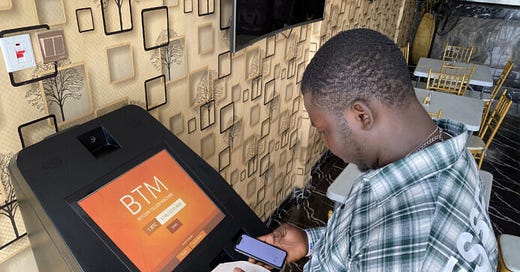What I learned about Blockchain from a French Tutor In Burundi
Imagine this:
You are a translator. You’ve done work for your family, friends you’ve met through school, and companies that have been referred to you by word of mouth.
Then, you get a referral to an overseas client. This client can pay you at much more competitive rates that match the quality of work you are providing.
But you can’t get paid — your bank account doesn’t take international transfers, it’s challenging to access a credit card or there are restrictions on sending and receiving international payments.
Maybe you can get a friend’s PayPal account, have the money transferred there, and then have your friend transfer the money out of PayPal, into their local bank account, and finally into your bank account.
Not only is that incredibly inconvenient, you also risk losing fees to middlemen like banks and payment platforms.
It’s not that you are unable or unwilling to work. You simply cannot receive income because of something you cannot control.
This is a real pain point experienced by Joseph, a french tutor living in Bujumbura, Burundi. For a long time, Joseph could not receive payments with a Paypal account. Joseph relied on using his friend’s Paypal account that was registered in another country to receive payments from his clients.
Going through several steps to get paid by international clients, diminishes Joseph’s discoverability and ability to access opportunities on freelance/gig platforms like Upwork and Fiverr. This story is well narrated by Samora Kariuki a leader in the fintech space in Africa in my podcast episode - Blockchain and the future of work.
This is a challenge that continues to remain prevalent in some parts of the world. A few months back, I personally experienced a similar problem. An international company tried to make a U.S. payment into our Nigerian account for work done, but the transaction could not be completed due to a regulatory restriction that barred sending USD payments into a local currency account in Nigeria. To be clear, this was a couple of months ago and I’m not sure how long the restriction will last.
This unfair scenario isn’t uncommon.
In the previous issue, I highlighted that one of the biggest challenges for Africa’s creator economy is the lack of payment options.
Essentially, current payment options are not inclusive enough and lock out talented people from the payment ecosystem.
This problem is what got me really curious and fascinated about blockchain and crypto. And As a curious beginner, made me spend tons of my time reading, listening, and learning from people like Peter Yang, Samora Kariuki, and other thought leaders who know a whole lot more than I do about this space.
Here is where the potential of blockchain technologies comes in.
Source: The Africa Report
With a cryptocurrency wallet — which runs on blockchain, and we’ll talk more about this in a bit — it really doesn’t matter where you are. You can receive income from anywhere in the world.
There are two key things to understand about blockchain that help it transform Africa’s creator economy.
Firstly, Ben Horowitz - the co-founder of Andreesen Horowitz and author of ‘The Hard Thing About Hard Things’, which I highly recommend you read, says it best. In his own words, he says:
‘Crypto has one feature that never existed before - that’s Trust. ‘
Trust is encoded within each block in a way that the information cannot be added, removed, or changed without being detected by others.
The second attribute is decentralization, where the transactions are stored on a network of computers and can be viewed by anyone and verified by a community of users. Crypto runs on a blockchain, which is a decentralized ledger. This sounds a bit fancy but bear with me here.
A decentralized ledger is essentially a database that is shared and synced across multiple locations and computers. This means that there is no main administrator. For any changes to happen, computers within this network have to approve this change.
Blockchain is a type of decentralized ledger. It’s hard to forge and alter cryptocurrencies that are built on blockchain, and even hard to attack the system.
In cryptocurrency, value is based on consensus decisions of the people participating in the currency, making it decentralized.
You might be thinking that this means the value is highly volatile, making crypto risky to hold. But there’s a new type of crypto called “stablecoins”, in which proof is provided that the coin is worth ‘x’ amount.
The cherry on top of the cake? It’s easier to obtain a crypto wallet than it is to set up a traditional bank account, and transfers occur much faster too.
I really like how Peter Yang summarizes what blockchain is:
Blockchains are:
Decentralized: Transactions are stored on a network of computers (nodes).
Immutable: Transactions cannot be changed once committed to the block.
Open: Transactions can be viewed by anyone.
Source: Forbes
Between July 2020 and June 2021, cryptocurrency uptake in Africa grew by 1,200%, making it the fastest in the world in terms of volume. However, in terms of value, the continent is still catching up to other regions.
With technologies like blockchain and crypto, creators and consumers are the ones who get to benefit the most. This is because we no longer need to rely on middlemen. Instead, those who are directly involved in creating and owning assets are those who get to reap the whole value of the work done.
What’s great about blockchain technologies like crypto is that they integrate Africans into the global financial ecosystem in an accessible manner.
With technological advancements like blockchain, creators are no longer constrained by location. They can take ownership of their own work, get compensated adequately, and leverage global opportunities.
Want to get more content like this? Click here to sign up for this email newsletter and podcast
Sincerely,
Agnes





